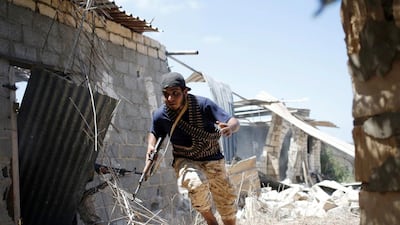ROME // The head of Libya’s UN-backed unity government said on Wednesday that the country did not need foreign troops on the ground in the fight against ISIL.
It came after the Washington Post reported on Tuesday that US special operations troops have begun directly supporting Libyan forces battling ISIL in the group's key stronghold of Sirte.
"We do not need foreign troops on Libyan soil," Government of National Accord (GNA) head Fayez Al Sarraj told Italy's Corriere della Sera newspaper.
“Our men can manage alone once they have cover from the air. I only asked for US air strikes which must be very precise and limited in time and geographical scope, always carried out in coordination with us.”
Pro-GNA forces have been engaged in a military operation since May 12 to retake the coastal city located 450 kilometres east of Tripoli. Sirte has been a stronghold of the extremist group since June last year.
Since last Monday, the United States has been carrying out air raids on ISIL positions in the city at the GNA’s request.
But according to the Post, US special forces are also operating alongside British troops, helping to coordinate American air strikes and providing intelligence to partner forces.
Also on Wednesday, Mr Al Sarraj said he “may go to Russia soon”, adding that his government had “good relations” with Moscow, but without providing further details on the possible trip.
He also warned that ISIL “will use any means possible to send its militants to Italy and Europe” and said he “would not be at all surprised to discover that its men hide out on boats” of migrants headed for the Italian coast.
Rome has authorised the US to use its bases and air space for strikes in Libya against ISIL.
Mr Al Sarraj’s remarks came as six Western countries including the US, Britain and Italy expressed concern over mounting tensions around the key Libyan oil terminal of Zueitina.
In a call also backed by Germany, Spain and France, the countries urged that control of all oil facilities in Libya “be transferred unconditionally and without preconditions or delay back to the legitimate national authorities”, referring to the GNA.
The expressed particular concern about “reports of increasing tension” near Zueitina, one of Libya’s largest oil facilities on the Mediterranean coast about 900 kilometres east of Tripoli.
Libya’s oil sector, the country’s main source of income, is managed by the National Oil Company which is split into two rival branches – each loyal to Libya’s two rival governments.
The main branch of the company is based in the capital and allied to the GNA, but a rival branch in the east of the country has so far refused to cede power to the Tripoli government and remains allied to a rival government based in the eastern city of Tobruk.
Forces loyal to Tobruk are threatening to seize Zueitina, which is currently mainly under the control of a rival faction, the Petroleum Facilities Guard (PFG). The PFG is loyal to the GNA.
The National Oil Company said earlier this month that it was preparing to resume exports of crude which have been halted for months because of political differences and attacks by extremists.
But the Tobruk authorities have threatened to bomb oil tankers that approach the Libyan coast without their permission.
* Agence France-Presse

